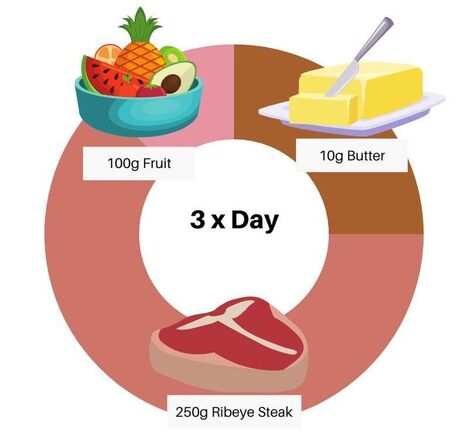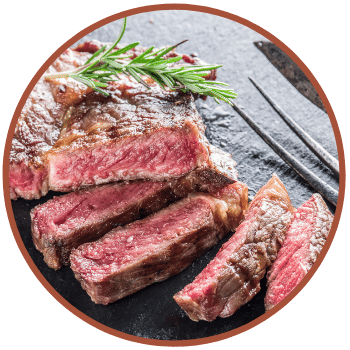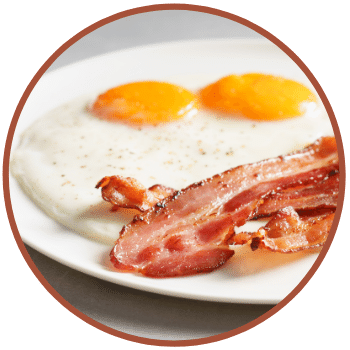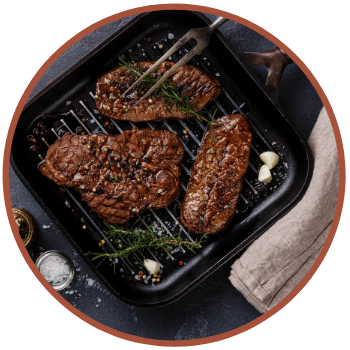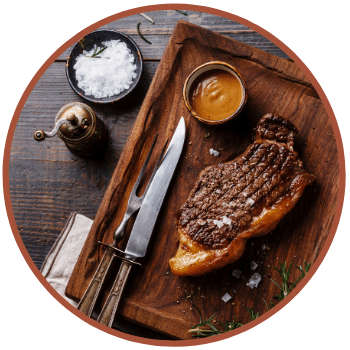CARNIVORE DIET MACRO CALCULATOR
Trying to figure out your carnivore diet macros, how to calculate macros in general or how many grams of protein and fat you should be eating is often the first barrier when it comes to success with your carnivore diet.
Calculating macros can mean the difference between feeling great all day every day or feeling low energy and running to the toilet every few hours. Not to mention that your gender will also make a difference in how much you need to eat so we have a macro calculator for women nut our calculator can also help with the calorie intake for a man.
In this guide, we'll go through the steps needed to get your carnivore diet calculation just right and what to do when you're experiencing negative symptoms.
If you haven't already, be sure to check out our comprehensive guide on the carnivore diet to get answers to some of the most common questions.
The Macro/Calorie calculator
The first thing you'll need to know is how many calories your body currently needs to get through the day. Whether you need a bulk diet calculator or your aim is losing weight and maintain a calorie deficit, we have you covered.
This number is going to change dramatically over time as your body fat percentage changes and your metabolism shifts to a more economic energy system and you'll need to eat fewer calories. That's why we prefer to use macro and calorie ranges, but for now, this is an easy way to start.
Use the gadget below to figure out how many grams of protein, fat, carbohydrates and calories your body needs in a day.
What makes this the best macros counter is that it calculates your macros based on your goal weight, not where you are now. The carnivore/keto macro calculator also offers a range of macros so you can adjust depending on whether you're trying to lose weight or bulking on the carnivore diet.
This number is going to change dramatically over time as your body fat percentage changes and your metabolism shifts to a more economic energy system and you'll need to eat fewer calories. That's why we prefer to use macro and calorie ranges, but for now, this is an easy way to start.
Use the gadget below to figure out how many grams of protein, fat, carbohydrates and calories your body needs in a day.
What makes this the best macros counter is that it calculates your macros based on your goal weight, not where you are now. The carnivore/keto macro calculator also offers a range of macros so you can adjust depending on whether you're trying to lose weight or bulking on the carnivore diet.
Interpreting these numbers
Now that you have a rough number of calories and macros you need per day, the next step is adjusting your macro needs to more closely match your goals on the carnivore diet. But how would you do that?
You'll notice the calculator has given you some guidelines but how does that look from a practical point of view? How much should you be eating from each food group?
You'll notice the calculator has given you some guidelines but how does that look from a practical point of view? How much should you be eating from each food group?
Protein Intake
Your protein intake should not be a percentage of your macros because protein is not used as a source of energy until you've depleted your fat and carbohydrate stores. Protein is a building block for growth and repair. Whether your goal is weight loss or weight gain, your protein intake will be a crucial part of achieving that goal.
You'll need around 0.8-1g of protein per pound of goal body weight if you're sedentary and 1-1.2g of protein per pound of goal body weight if you're training hard or trying to gain muscle.
You'll need around 0.8-1g of protein per pound of goal body weight if you're sedentary and 1-1.2g of protein per pound of goal body weight if you're training hard or trying to gain muscle.
Getting Enough Fat
Contrary to popular belief, fat isn't just fat. Fat is a source of energy, a source of essential fatty acids and a source of essential vitamins and minerals.
You'll need around 0.8g-1g of fat per 1lb of body weight. While it may seem a little less than protein, that's because fat has 9 calories per gram compared to only 4 calories per gram in protein. Fat is extremely energy dense.
If you're working with an autoimmune condition or feel low energy with your current fat intake, a lot of people have success with higher saturated fat and lower protein intake.
Just be sure to get most of your fat from animal sources and not plant sources like olive oil and seed oils.
You'll need around 0.8g-1g of fat per 1lb of body weight. While it may seem a little less than protein, that's because fat has 9 calories per gram compared to only 4 calories per gram in protein. Fat is extremely energy dense.
If you're working with an autoimmune condition or feel low energy with your current fat intake, a lot of people have success with higher saturated fat and lower protein intake.
Just be sure to get most of your fat from animal sources and not plant sources like olive oil and seed oils.
Getting Enough Carbs
The carbohydrate recommendations are based on this research paper, highlighting how many carbs a human actually needs for sports performance:
To answer the most common question, yes, your body does need carbs. So much so, that your body, specifically the liver, actually makes them all day for you. Of course, you can go 100% carb free on a carnivore diet and, after a transition period, you'd do just fine.
However, if you'd like to gain muscle while optimising body fat, you might benefit from some carbohydrates. Why? Because gaining super physiological amounts of muscle is NOT natural (ever seen a bodybuilder tribesman?). Muscle is expensive to make and even more expensive to maintain. Being able to gain muscle is a privilege of modern society.
Carbs aid in the process of gaining muscle by reducing muscle catabolism (breakdown), they can lower stress, improve sleep and help your body make the hormones required for muscle growth.
If you do choose to use them, be sure to use a source that aligns most closely with your goals and consider using the remaining calories after you calculated your protein and fat intake.
How This Might Look
That's all well and good, but how would this actually look on a plate? Here's how that might look as food on your plate if you're 170lb, train 4 x week and want to maintain body weight:
Of course, you might want to eat only 1 or 2 times per day and may want to lose or gain weight.
READ MORE: CARNIVORE DIET FOODS
Test & Tweak
If you happen to be the type of person that sits nicely on the macro split provided by the macro calculator above, great! You're all set. Unfortunately most people don't, at least for some time and they can get negative symptoms.
As an example, I happen to have a few genetic predispositions that make me less tolerant of fat so I feel better on a higher protein to fat ratio. For that, I simply eat enough protein and consume fat to satiety.
You might also find that all this new found fat in your diet will cause you to experience negative side effects like diarrhea. This is because your gallbladder, the organ responsible for creating enzymes that break down fat isn't quite as efficient as it should be so you might need to back of the fat to give the little guy some time to adapt.
On the flip side, you might also feel lethargic and low energy which is usually due to not having enough fat.
Bit of a catch 22 if you experience both and some people can have a really hard time when starting out.
To figure out YOUR carnivore diet macros, you'll need to do some testing and tweaking and with your protein to fat ratios. It can be a bit of a nightmare to start out with but keep at it.
As an example, I happen to have a few genetic predispositions that make me less tolerant of fat so I feel better on a higher protein to fat ratio. For that, I simply eat enough protein and consume fat to satiety.
You might also find that all this new found fat in your diet will cause you to experience negative side effects like diarrhea. This is because your gallbladder, the organ responsible for creating enzymes that break down fat isn't quite as efficient as it should be so you might need to back of the fat to give the little guy some time to adapt.
On the flip side, you might also feel lethargic and low energy which is usually due to not having enough fat.
Bit of a catch 22 if you experience both and some people can have a really hard time when starting out.
To figure out YOUR carnivore diet macros, you'll need to do some testing and tweaking and with your protein to fat ratios. It can be a bit of a nightmare to start out with but keep at it.
What I eat
I'm just a 170lb guy who cured a decade of chronic IBS and all of the other associated symptoms using the carnivore diet, I love training hard in the gym (sometimes twice per day) and nutritional science.
With that said, I often get asked what I eat in a day and it seems to be quite useful to most to get an example of how the guidelines from the macro calculator above might look in practice. |
|
Breakfast:
|
Lunch (pre workout):
|
Dinner:
|
Of course, the amount I eat may vary slightly depending on how hard and how often I train as I sometimes train twice per day. The types of fruit I eat also change seasonally depending on what's available where I live here in Thailand. You might also be wondering:
If you eat fruit, surely you aren't carnivore?
Who knows. Carnivore is a broad term used to describe the amount of animal foods a species consumes, and it seems any YouTube doctor in scrubs can decide for themselves what "true" carnivore is. Some species, like bears, are considered carnivore but get 10-30% of their calories from plant foods. Either way, I'm not trying to BE carnivore, I use carnivore as a tool to reset and fix my body as and when I need to.
Why all the carbs?
I eat around 50-100g of carbs per day because I like to workout at a high level and I'm trying to build as much natural muscle as possible before I no longer can due to the decrease in protein synthesis as we age. The amount and intensity of the training I do offsets any carbohydrates I eat by a long way and makes training intensely and building muscle much, much easier. Plus, it increases my nutrient profile in a positive way.
Why fruit and not dairy?
I don't feel so good on dairy so I opt for fruit. Did you know that fruit is a huge source of pre and probiotics! It was news to me too. Some fruit in my diet improves my digestion, keeps my electrolytes in check while training in a hot climate, and provides me with more essential nutrients and the energy I need to workout.
If you eat fruit, surely you aren't carnivore?
Who knows. Carnivore is a broad term used to describe the amount of animal foods a species consumes, and it seems any YouTube doctor in scrubs can decide for themselves what "true" carnivore is. Some species, like bears, are considered carnivore but get 10-30% of their calories from plant foods. Either way, I'm not trying to BE carnivore, I use carnivore as a tool to reset and fix my body as and when I need to.
Why all the carbs?
I eat around 50-100g of carbs per day because I like to workout at a high level and I'm trying to build as much natural muscle as possible before I no longer can due to the decrease in protein synthesis as we age. The amount and intensity of the training I do offsets any carbohydrates I eat by a long way and makes training intensely and building muscle much, much easier. Plus, it increases my nutrient profile in a positive way.
Why fruit and not dairy?
I don't feel so good on dairy so I opt for fruit. Did you know that fruit is a huge source of pre and probiotics! It was news to me too. Some fruit in my diet improves my digestion, keeps my electrolytes in check while training in a hot climate, and provides me with more essential nutrients and the energy I need to workout.


